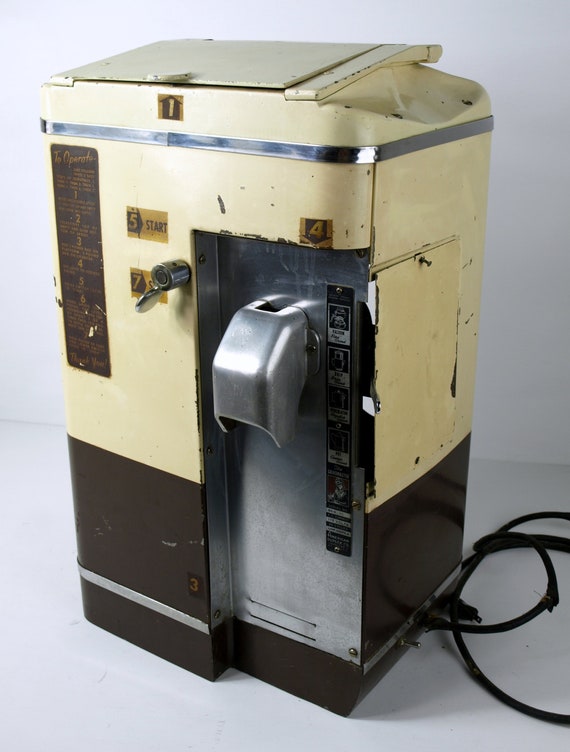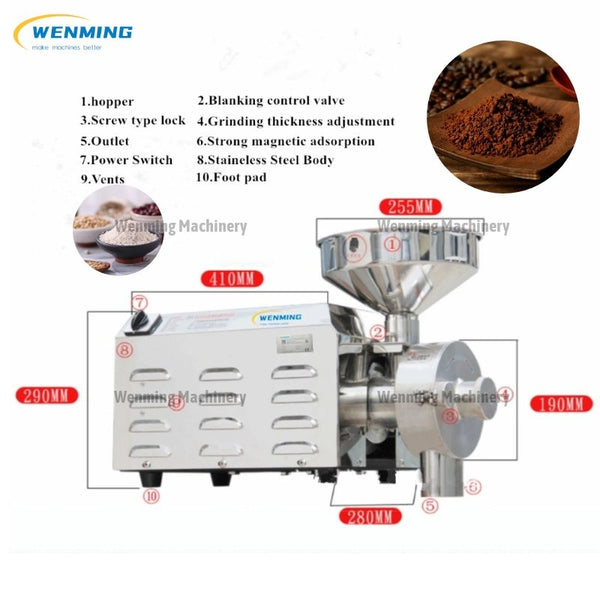Just How to Select the Perfect Industrial Coffee Mill for Your Company
Selecting the excellent industrial coffee grinder for your organization is a multifaceted decision that calls for careful consideration of numerous crucial aspects. In addition, recognizing the various types of grinders offered can substantially influence your operational effectiveness.
Assess Your Grinding Requirements
When picking a commercial coffee mill, one must first analyze their grinding demands to ensure ideal performance and consistency. This preliminary evaluation involves understanding the volume of coffee to be processed daily, as well as the desired work size for various brewing methods. A high-capacity mill might be necessary for organizations serving big quantities of coffee, while smaller operations may locate an extra portable design adequate.
Moreover, it is vital to think about the kinds of coffee beans being used, as various beans might need particular grinding methods to accomplish the best flavor account. Oily beans may necessitate a mill created to take care of such attributes without overheating or clumping.
One more crucial element is the required work consistency. Specialized coffee services typically require exact grind dimensions to improve removal and flavor, making it crucial to select a grinder that can supply uniform outcomes. Assessing the readily available area and electric requirements will certainly help in picking a grinder that fits effortlessly into your operational operations. By thoroughly analyzing these variables, companies can make informed decisions that straighten with their coffee grinding requirements, inevitably resulting in a premium product and pleased consumers.
Understand Grinder Kind
Recognizing the different kinds of commercial coffee mills is important for making an educated option that fulfills specific operational demands. There are mostly 2 groups of mills: blade mills and burr mills.
Blade mills make use of rotating blades to cut the coffee beans, causing an irregular work size - Industrial Coffee Grinder. While they might be a lot more budget-friendly, they are usually not ideal for business applications where precision is necessary
On the various other hand, burr grinders offer a much more uniform grind by squashing the beans between two surfaces. They can be further categorized right into level burr and conelike burr mills. Flat burr grinders offer a consistent grind size and are usually favored for espresso prep work, while conelike burr grinders are flexible and can deal with a variety of mixture techniques, from coffee to French press.
When picking a mill, think about the particular demands of your business, including desired work consistency, manufacturing volume, and the sorts of coffee beverages you plan to use - Industrial Coffee Grinder. Each grinder type has its benefits and limitations, so comprehending these subtleties makes it possible for educated decision-making that lines up with operational goals
Evaluate Work Size Uniformity
Accomplishing work dimension uniformity is essential for producing high-quality coffee, as variations in bit size can dramatically impact extraction and taste. When selecting an industrial coffee mill, it is vital to assess just how well the device keeps uniformity in grind size throughout different sets. Irregular grind dimensions can cause irregular extraction, causing a cup that might taste weak or extremely bitter.
To evaluate work size uniformity, think about grinders with functions such as adjustable grind settings and high-quality burrs. Burr mills, specifically, master generating uniform fragment sizes compared to blade grinders. The product and shape of the burrs play an important role, with stainless-steel and ceramic choices offering resilience and precision.

Take Into Consideration Manufacturing Ability
In the fast-paced world of coffee production, thinking about manufacturing ability is critical for businesses intending to satisfy demand without compromising top quality. The manufacturing ability of an industrial coffee grinder directly influences a company's ability to fulfill orders efficiently, manage stock, and reply to changing market patterns.
When examining manufacturing capability, it is crucial to review the mill's result price, normally gauged in extra pounds per hour. This measurement ought to line up with your company's projected sales volume and development targets. For circumstances, a coffee shop with a high turn over may need a grinder that can process numerous hundred pounds daily, while a smaller sized operation could suffice with a lower capacity version.
Furthermore, think about the type of coffee being refined. Different beans and blends might affect grinding speed and effectiveness, necessitating a grinder capable of taking care of varied production requirements. It's also worth considering the mill's ability to preserve consistent top quality under high output problems, as any changes can affect the end product.
Eventually, selecting a mill that matches your service's production capability will certainly ensure you continue to be responsive and affordable to client assumptions.

Budget and Upkeep Factors
When assessing the right industrial coffee upkeep, grinder and budget variables play a considerable role in the general decision-making procedure. A first investment in a premium mill can generate lasting advantages, however it's necessary to establish a clear budget that lines up with your service's functional demands. Think about both the purchase cost and prospective operational costs, such as power intake and substitute parts.
Industrial coffee mills need regular maintenance to make certain ideal performance and longevity. Review the maker's recommendations for upkeep, consisting of cleaning get redirected here schedules and components replacement, as these will impact long-lasting functional expenses.

Investing in a mill that is resilient yet very easy to preserve can save cash in time. While lower-priced alternatives may be tempting, they may sustain higher upkeep expenses and reduced effectiveness. Ultimately, stabilizing initial expenses with lasting maintenance and functional performance will assist you to the most effective option for your business's coffee grinding requirements.
Verdict
Choosing the excellent commercial coffee grinder requires an extensive analysis of grinding needs, mill kinds, grind size consistency, manufacturing capacity, and monetary considerations. By prioritizing these variables, services can ensure the purchase of a dependable, effective mill that fulfills specific operational demands. An appropriate grinder not only improves the top quality of the coffee generated but likewise adds to the total success and productivity of the enterprise. Long-term performance and maintenance simplicity must continue to be main to the decision-making procedure.
Specialized coffee organizations usually require specific work sizes to improve extraction and taste, making it vital to choose a mill that can supply uniform outcomes. Apartment burr mills use a constant grind size and are generally favored for coffee prep work, while cone-shaped burr grinders are functional and can manage an array of mixture techniques, from espresso to French press.
When picking a commercial coffee grinder, it is crucial to review just how well the maker preserves uniformity in my website work size throughout various batches. Burr mills, in specific, excel in producing consistent bit sizes contrasted to blade grinders.Picking the ideal commercial coffee grinder requires a detailed examination of grinding requirements, mill types, grind size consistency, manufacturing capability, and budgetary factors to consider.